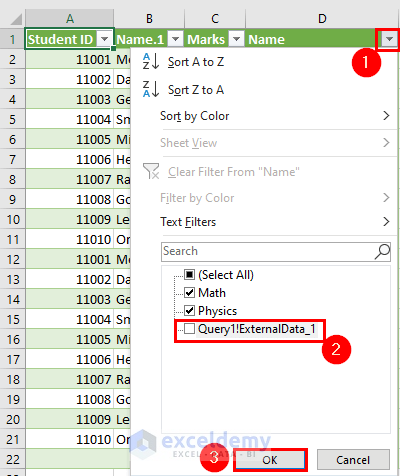3 Simple Ways to Merge Excel Sheets Into One

Merging Excel sheets into a single worksheet is often a necessity for data analysis, reporting, or simplifying record keeping. While it might sound like a daunting task, with the right approach, it can be straightforward. In this guide, we'll explore three simple methods to merge Excel sheets into one.
Method 1: Using Copy and Paste

The most basic method to merge Excel sheets is by using the copy-paste feature. This method works best when you only have a few sheets to combine.
Step-by-Step Guide:

- Open Excel: Launch Microsoft Excel and open the workbook containing the sheets you want to merge.
- Select Sheets: Click on the tab of the first sheet you want to merge. Hold down the
Ctrlkey and select additional sheets as needed. - Copy Data: Right-click on the selected sheets and choose “Copy” or use
Ctrl + C. - Create New Sheet: Right-click on any tab, select “Insert” or “New Sheet” to create a new worksheet.
- Paste Data: In the new sheet, right-click on cell A1 and choose “Paste” or use
Ctrl + V.
🔍 Note: Ensure all data in the sheets aligns properly; if you have headers in different sheets, they might need to be adjusted manually.
Method 2: Using Excel’s Consolidate Feature

For more complex merging tasks involving data from multiple sheets, Excel’s Consolidate feature can be very useful. It allows you to combine data based on specific criteria.
Step-by-Step Guide:

- Navigate to Consolidate: Select the cell where you want the merged data to start. Then, go to the Data tab and click “Consolidate.”
- Choose Function: Select the function you want to use (e.g., Sum, Average). For simple merging, choose “Sum” or “None.”
- Select Source: In the “Reference” field, click the collapse dialog button to select the range from your first sheet, then add to the list. Repeat for all sheets you wish to consolidate.
- Combine: Click “OK” to merge the data based on your selected function.
🚨 Note: If using functions like Sum or Average, ensure you have consistent data headers in each sheet to avoid confusion.
Method 3: Using VBA Script

If you’re comfortable with macros, VBA (Visual Basic for Applications) offers a powerful way to automate the merging of Excel sheets with just a few clicks.
Step-by-Step Guide:

- Open VBA Editor: Press
Alt + F11to open the VBA editor. - Insert Module: Click “Insert” > “Module” to add a new module.
- Enter Script: Copy and paste the following VBA script into the module:
Sub MergeSheets() Dim ws As Worksheet Dim mainWs As Worksheet Dim rowCount As Long' Create a new worksheet to hold merged data Set mainWs = ThisWorkbook.Worksheets.Add mainWs.Name = "Merged_Sheet" ' Loop through all sheets For Each ws In ThisWorkbook.Worksheets If ws.Name <> "Merged_Sheet" Then rowCount = mainWs.Cells(mainWs.Rows.Count, 1).End(xlUp).Row + 1 ws.UsedRange.Copy mainWs.Cells(rowCount, 1) End If Next ws
End Sub
Alt + F8, select “MergeSheets”, and click “Run.”🛠️ Note: Macros can modify your workbook, so save a backup before running them, and ensure macros are enabled in Excel.
To summarize, merging Excel sheets can be approached in several ways. The copy-paste method is straightforward for quick tasks, the Consolidate feature offers more control for structured data, and VBA scripting provides automation for repetitive tasks. Each method has its strengths, depending on the complexity and frequency of your merging needs.
What if the sheets have different structures?

+
If sheets have different structures, manual alignment will be necessary. Copy-paste might work if you can manually adjust the data, or you might need to write a more complex VBA script to handle structural differences.
Can I merge sheets from different Excel files?

+
Yes, you can. For the Consolidate method, you would need to open each file and manually select the data. VBA scripting can also be adapted to merge data from different workbooks.
Are there any limitations to these methods?

+
Copy and Paste works well for simple merges but can be time-consuming for many sheets. Consolidate might be limited by how data is matched across sheets, and VBA scripts can be complex to write and maintain. Each method has its use cases based on the complexity of your task.